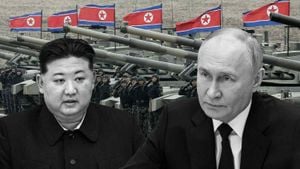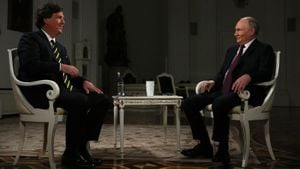North Korea's involvement alongside Russia during its invasion of Ukraine has become increasingly pronounced as the two nations deepen their ties, sparking concerns about the potential consequences for global stability. Ukrainian President Volodymyr Zelenskyy has been vocal about the looming threat posed by North Korean troops, urging allies to shift from passive observation to proactive measures.
Zelenskyy recently highlighted the growing military collaboration between North Korea and Russia, referencing reports from the U.S. Department of Defense indicating the presence of approximately 10,000 North Korean troops stationed predominantly within Russia's southern Kursk region, which shares proximity to Ukraine. This region has seen its share of hostilities as Ukrainian and Russian forces jostle for power.
"The first thousands of soldiers from North Korea are near the Ukrainian border. Ukrainians will be forced to defend themselves against them," asserted Zelenskyy, voicing his frustration at the lack of urgent responses from Western nations. He noted, "Instead of such necessary long-range capability, America watches, Britain watches, Germany watches..." His calls for action came as he expressed Ukraine’s urgency for long-range weaponry to counter any imminent threat.
Confirming the deployment of North Korean troops, NATO has reported significant escalations as those troops might be gearing up to support Russian military operations against Ukraine. NATO's Secretary-General Mark Rutte characterized this as indicative of Russian President Vladimir Putin’s growing desperation, as sources indicated over 600,000 Russian casualties since the onset of the conflict.
Russia and North Korea have forged closer military ties since the war began, with Pyongyang expressing its unwavering support. Recently, North Korean Foreign Minister Choe Son Hui assured Russian Foreign Minister Sergei Lavrov of North Korea's commitment to standing by Russia until it achieves "victory" over Ukraine. This mutual support has raised alarms, particularly among neighboring countries and allies of Ukraine.
Complicatory elements arise as North Korea’s military capabilities, which include missile development and weapon production, are reportedly advancing. During the meeting between Choe and Lavrov, Choe reiterated North Korea’s goal of enhancing its military standing, including its nuclear program, as it engages with Russia.
The militarization of North Korea under Kim Jong Un's leadership raises eyebrows, not only for Ukraine but also for countries with strategic interests nearby. Zelenskyy warned, "This war is becoming internationalized, extending beyond two countries," emphasizing the interconnectedness of geopolitical tensions stemming from the Ukraine conflict.
The U.S. has reacted by reaffirming its support for Ukraine, including giving the green light for potential strikes against any North Korean forces engaging allies. John Kirby, U.S. national security spokesman, stated, "If North Korean troops do deploy to fight against Ukraine, they’re fair game," highlighting the U.S. stance on protecting its allies against foreign adversaries.
Despite the clear signals of international military tensions, attempts by Ukraine to request additional weaponry from the West faced hurdles. Zelenskyy indicated there’s been talk of acquiring long-range Tomahawk missiles from the U.S.—missiles capable of hitting targets well beyond current capabilities. These discussions coincide with Ukraine's broader military strategy aimed at repelling the multifaceted threats posed by both Russia and North Korea.
China, often seen as North Korea’s closest ally, has taken a step back, indicating it does not intend to intervene or influence the deepening ties between Russia and Pyongyang. The Chinese Foreign Ministry underscored the sovereignty of both nations, remarking, "How they develop bilateral relations is their own matter," which strikes some as eerie silence amid the mounting global precariousness.
Meanwhile, South Korea has expressed concern over the developments. President Yook Suk Yeol articulated the need for vigilance, echoing Zelenskyy’s warnings. The growing presence of North Korean troops involved in the Russia-Ukraine war has pushed Seoul to reconsider its strategic posture, drawing closer to Ukraine amid rising defenses.
With both nations tasked with responding to the shifting military dynamics, Zelenskyy’s entreaty urges not just Ukraine’s allies but the global community to intervene decisively. "Everyone who genuinely wishes to see the Russian war against Ukraine not escalate… must not just watch. They must act," he asserted fervently.
This unprecedented alliance between North Korea and Russia not only escalates the situation for Ukraine but raises questions about the broader regional stability. The intertwined futures of these geopolitical actors suggest the necessity for active engagement from allies like the U.S. and South Korea to counter any potential escalations head-on, ensuring steps are taken to halt the advance of hostile militaries encroaching upon Ukraine’s borders.
Going forward, the military options available to Ukraine hinge heavily on the support it can expect from its allies. Early industrial mobilizations signal potential for increased armaments coming from Western nations, but as Zelenskyy seeks to navigate these uncertain waters, he calls for not only military aid but also cohesive diplomatic actions responding to the budding crisis.
The conflict, marked now with the involvement of external allies like North Korea, is poised to challenge the resolve of Ukraine and its supporters at multiple levels, necessitating not just military readiness but unified political resolve among those who cherish democratic peace against autocratic aggression.



